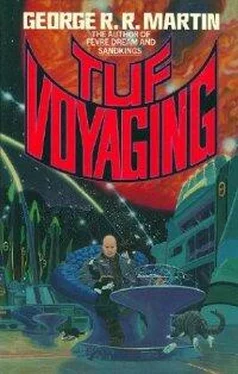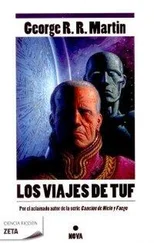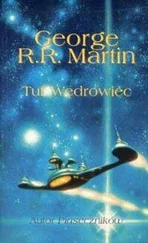Other, lesser tubes branched from the spurs, and still lesser passages from them, crossing and recrossing the void, binding everything together in a pattern that grew in intricacy each year, as more and more additions were made.
And between the web strands were the flies—shuttles going up and down from the surface of S’uthlam with consignments too big or too volatile for the elevator, mining ships coming in with ore and ice from the Frags, food freighters from the terraformed farming asteroids inward they called the Larder, and all manner of interstellar traffic: luxurious Transcorp liners, traders from worlds as close as Vandeen or as distant as Caissa and Newholme, merchant fleets from Kimdiss, warships from Bastion and Citadel, even alien starcraft, Free Hruun and Raheemai and gethsoids and other, stranger species. They all came to the Port of S’uthlam and were welcome.
The ones who lived in Spiderhome, who worked in the bars and mess halls, moved the cargos, bought and sold, repaired and fueled the ships, they called themselves spinnerets as a badge of honor. To them, and to the flies who came calling often enough to be regulars, Tolly Mune was Ma Spider—irascible, foul-mouthed, rough-humored, frighteningly competent, omnipresent, indestructible, as big as a force of nature and twice as mean. Some of them, those who had crossed her or earned her displeasure, had no love for the Portmaster; to them she was the Steel Widow.
She was a big-boned, well-muscled, homely woman, as gaunt as any honest S’uthlamese but so tall (almost two meters) and so broad (those shoulders) that she had been considered something of a freak downstairs. Her face was as creased and comfortable as old leather. Her age was forty-three local, nearing ninety standard, but she didn’t look an hour over sixty; she attributed that to a life in orbit. “Gravity’s the thing that ages you,” she would say. Except for a few starclass spas and hospitals and tourist hotels in the Spiderhome, and the big liners with their gravity grids, the Port turned in endless weightlessness, and free fall was Tolly Mune’s natural element.
Her hair was silver and iron, bound up tightly when she worked, but off-duty it flowed behind her like a comet’s tail, following her every motion. And she did move. That big, gaunt, raw-boned body of hers was firm and graceful; she swam through the spokes of the web and the corridors, halls, and parks of Spiderhome as fluidly as a fish through water, her long arms and thin, muscular legs pushing, touching, propelling her along. She never wore shoes; her feet were almost as clever as her hands.
Even out in naked space, where veteran spinnerets wore cumbersome suits and moved awkwardly along tether lines, Tolly Mune chose mobility and form-fitting skinthins. Skinthins gave only minimal protection against the hard radiation of S’ulstar, but Tolly took a perverse pride in the deep blue-black cast of her skin, and swallowed anti-carcinoma pills by the handful each morning rather than opt for slow, clumsy safety. Out in the bright hard black between the web strands, she was the master. She wore airjets at wrist and ankle, and no one was more expert in their use. She zipped freely from fly to fly, checking here, visiting there, attending all the meetings, supervising the work, welcoming important flies, hiring, firing, solving any problem that might arise.
Up in her web, Portmaster Tolly Mune, Ma Spider, the Steel Widow, was everything she had ever wanted to be, equal to every task, and more than satisfied with the cards she’d drawn.
Then came a night-cycle when she was buzzed from a sound sleep by her Deputy Portmaster. “It better be goddamned important,” she said when she stared at him over her vidscreen.
“You better access Control,” he said.
“Why?”
“Fly coming in,” he said. “Big fly.”
Tolly Mune scowled. “You wouldn’t dare wake me up for nothing. Let’s have it.”
“A real big fly,” he stressed. “You have to see this. It’s the biggest damn fly I’ve ever laid eyes on. Ma, no fooling, this thing is thirty kays long.”
“Puling hell,” she said, in the last uncomplicated moment of her life, before she made the acquaintance of Haviland Tuf.
She swallowed a handful of bright blue anti-carcinogens, washed them down with a healthy squeeze from a bulb of beer, and studied the holo apparition that stood before her. “Large ship you’ve got there,” she said casually. “What the hell is it?”
“The Ark is a biowar seedship of the Ecological Engineering Corps,” replied Haviland Tuf.
“The EEC?” she said. “You don’t say.”
“Must I repeat myself, Portmaster Mune?”
“This is the Ecological Engineering Corps of the old Federal Empire, now?” she asked. “Based on Prometheus? Specialists in cloning, biowar—the ones who custom-tailored all kinds of ecological catastrophe?” She watched Tuf’s face as she spoke. He dominated the center of her small, cramped, disorderly, and too-seldom-visited office in Spiderhome, his holographic projection standing among the drifting, weightless clutter like some huge white ghost. From time to time a balled up sheet of paper floated through him.
Tuf was big. Tolly Mune had met flies who liked to magnify themselves in holo, so they came across as bigger than they were. Maybe that was what this Haviland Tuf was doing. Somehow she thought not, though; he didn’t seem the sort. Which meant he really did stand some two-and-a-half meters tall, a good half-meter above the tallest spinneret she’d ever met. And that one had been as much a freak as Tolly herself; S’uthlamese were a small people—a matter of nutrition and genetics.
Tuf’s face gave absolutely nothing away. He interlocked his long fingers calmly on top of the swollen bulge of his stomach. “The very same,” he replied. “Your historical erudition is to be commended.”
“Why, thank you,” she said amiably. “Correct me if I’m wrong, though, but being historically erudite and all, I seem to recall that the Federal Empire collapsed, oh, a thousand years ago. And the EEC vanished too—disbanded, recalled to Prometheus or Old Earth, destroyed in combat, gone from human space, whatever. Of course, the Prometheans still have a lot of the old biotech, it’s said. We don’t get many Prometheans way out here, so I couldn’t say for sure. But they’re a bit jealous about sharing any of their knowledge, I’ve heard. So, let me see if I’ve got this straight. You’ve got a thousand-year-old EEC seedship there, still functional, which you just happened to find one day, and you’re the only person on board and the ship is yours?”
“Correct,” said Haviland Tuf.
She grinned. “And I’m the Empress of the Crab Nebula.”
Tuf’s face remained expressionless. “I fear I have been connected to the wrong person then. I wished to speak to the Portmaster of S’uthlam.”
She took another squeeze of beer. “I’m the puling Portmaster,” she snapped. “Enough of this goddamned nonsense, Tuf. You’re sitting out there in a thing that looks suspiciously like a warship and happens to be about thirty times the size of the largest so-called dreadnaught in our so-called Planetary Defense Flotilla, and you’re making one hell of a lot of people extremely nervous. Half of the groundworms in the big hotels think you’re an alien come to steal our air and eat our children, and the other half are certain that you’re a special effect we’ve thoughtfully provided for their amusement. Hundreds of them are renting suits and vacuum sleds right now, and in a couple of hours they’ll be crawling all over your hull. And my people don’t know what the hell to make of you either. So come to the goddamned point, Tuf. What do you want?”
“I am disappointed,” said Tuf. “I have led myself here at great difficulty to consult the spinnerets and cybertechs of Port S’uthlam, whose expertise is far famed and whose reputation for honest, ethical dealing is second to none. I did not think to encounter unexpected truculence and unfounded suspicions. I require certain alterations and repairs, nothing more.”
Читать дальше












